Logic, Rationality and Common Sense (3)
Common Sense
Common sense is a basic ability to judge things, a basic awareness of how things are, that we all naturally assume to have in common with other people. We all assume that we can make basic sense of the world, and we also assume that other people of good judgement - note the smug self-congratulation - make sense of the world in roughly the same ways as we do. This does not mean at all that we can fully explain how this process of sense-making works. Common sense has something to do with the we-space that we generate when we are in communion with the people surrounding us, and with what we tacitly assume about that we-space.
Below I would like to discuss the notion of common sense by entering in a conversation with three philosophers of fame that have adopted very different perspectives on this. According to Friedrich Nietzsche, we do have one advantage over great philosophers like Descartes and Hume, for they are dead and we are alive. Nietzsche is dead now too. The only way of bringing deceased philosophers back to life is by bringing them in our living presence. If you read the original writings of a great philosopher, you soon get a sense of the style, a sense of the person emerging from the written words. In that way, trusting our imagination, we can engage in a conversation, we can enter into a dialogue about stuff that engages us. What do I say, and what would they say in return?
One of the great critics of the idea of common sense as a source of knowledge was René Descartes. Descartes starts his famous Discours de la méthode (Discourse on Method) with a mocking remark that common sense is the most equally divided good in the world. It is never in short supply, because every person believes that he has more than enough of it, even people who feel shortchanged in everything else.
Here is a copy of a famous picture that Frans Hals painted of Descartes in 1649 (the copy is in the Louvre, the original got lost). Descartes was born in France in 1596, he wandered through Europe as an adventurer-soldier for a few years, and after that he spent the fertile years in which he wrote his major philosophical and scientific works in the Dutch Republic. In 1649 - this must have been shortly after Frans Hals painted him - he moved to Sweden, where he died after a unhappy period at the court of Queen Christina, in 1650.
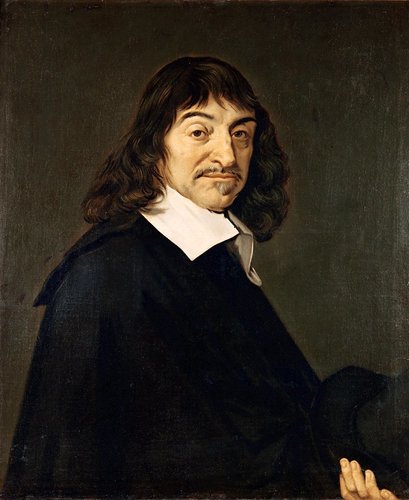
Descartes was a fellow who did not lack self confidence. You see that in the picture, and you sense it in his writing style. He was a brilliant man, and he knew it. He was also not afraid to show his feelings, something that I can easily relate to. A trait that I find more difficult is Descartes’ longing for certainty, and his belief that reason can be used, and should be used, to master and guide the passions. He loved mathematics, he had a deep belief that physics could be transformed by the proper application of mathematical methods, and he knew from firsthand experience that mathematical insight could give him certainty. But he decided to start from scratch.
What was the ultimate source of the certainty that he experienced when grasping mathematical concepts? The most certain thing we have is the sense of our own existence. Even if I have doubts that in itself means that I think, and the fact that I think it means that I exist. A thinking entity has to exist. On this firm foundation Descartes erected a structure built with the mortar of mathematical proof. The purely subjective sense of certainty became the cornerstone of his worldview, where reason was paramount.
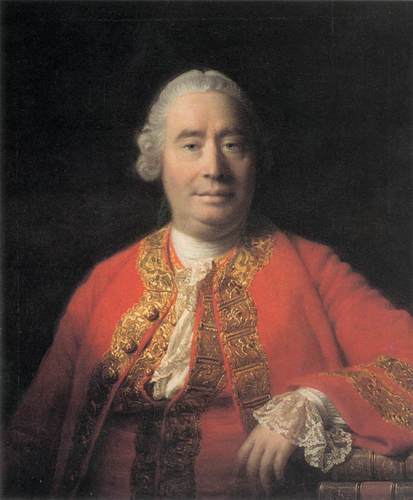
David Hume (1711 - 1776) was an Scottish empiricist philosopher, a great advocate of studying man from the outside. He is most famous for his insistence that the study of facts, the study of how things are, can never lead to a normative conclusion, how things ought to be. You cannot derive an ought from an is. So where do our normative judgements come from? According to Hume, they come from our emotions. And the civilizing effect of good company, the common sense of our friends that we admire, can help us to decide how to live.
If you read Hume, you get a sense of a man in equilibrium, a man who knows the world and its folly, and who knows that it is possible to lead a pleasant and fulfilling life by accepting the fact that each person is ultimately motivated by the passions arising from inside, kept in check - more or less - by clear or less clear philosophical reflection.
With care and avoidance of all that is unnecessary we can get a clearer view of who we are and how we function. We can and should study man in the same manner as Newton studied the movements of the planets, and this will give us a proper picture of how the mind works, and how everything the mind composes derives ultimately from the vivid impressions that are the result of contact with the outside world. There is an inside and an outside to us. There can be clarity, and the pleasure of good company, the relish of wine, and well-adjusted action in the world. A pleasant man, David Hume, maybe even a happy man, but a man who keeps a well guarded measure of ironic distance from his own self.
Søren Kierkegaard (1813 - 1855) is completely different. This Danish philosopher (and poet, and social critic, and religious author) was obsessed with self. He insisted on taking the first person view. My first acquaintance with him is from my secondary school days, because to some of the priest-teachers at my Roman Catholic boarding school he was a hero. The first person perspective that Kierkegaard takes is also what Descarted started with, but Descartes only took it as a rock solid foundation for the third person edifice of his rationalist philosophy.
Kierkegaard, on the other hand, was not interested in certainty. His focus was on action, more in particular on the fact - for Kierkegaard a deep experience - that every human being defines itself through action. Also, Kierkegaard was acutely aware of the fact that all the stories we tell about ourselves are ultimately false. Every attitude to life is just an attitude, ultimately based on nothing. We might as well drop it and tell a different story, a story that sheds light on a different aspect of our self.

In 1998-1999 I was taking part in a year-long training course in improvised theatre led by Dutch actor and theatre maker Helmert Woudenberg. This inspired me to invent a new method in philosophy. Why not drop the obsession with certainty, and instead engage in dialogue or encounter with everyone who is interested in gaining more clarity about what his or her life is about? This resulted in a manuscript, in Dutch, that lingered on my website for years, and that finally got published, in 2013, as a pamplet by a small publishing company nextdoor to our home, Uitgeverij De Buitenkant.
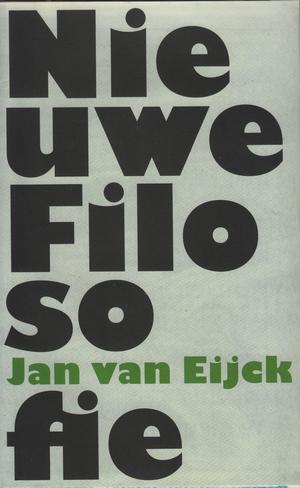
Here is a quote, in Dutch:
De nieuwe filosofie weet dat er vragen zijn die weliswaar geen definitief en eensluidend antwoord hebben, maar die moeten worden gesteld, door iedereen, en telkens weer, omdat alleen dat ons bewust maakt van hoe we handelen, en van wat de gevolgen zijn van ons handelen. Dat is de enige manier om de stap te zetten van een primitieve cultuur die zich blind ontwikkelt naar een samenleving van bewust naar wijsheid strevende individuen, een samenleving die een heldere koers kan gaan varen omdat haar leden elk voor zich het heft van hun leven bewust in handen hebben genomen.
Translation:
The new philosophy knows that there are questions that do not have definitive and certified answers, but that still have to be posed, by everyone, time and again, because only this will make us conscious of how we act, and of the consequences of our actions. Only in this way we can take the step from a primitive, blindly developing culture to a community of individuals that are each consciously striving for wisdom, a community that is able to steer a clear course because its members each for themselves have taken the helm of their lives in their own hands.
As the pamplet explains, the most important question of all is Who am I, who do I want to be, what kind of life do I want to live? One can derive quite a bit of information about oneself by making a list of role models. Who are the people that I admire, and why do I admire them? I already mentioned scientists David MacKay and Maarten Scheffer, and my reasons for admiring them.
A playwright and poet turned dissident and ending up as a politician that I admire very much is Václav Havel.
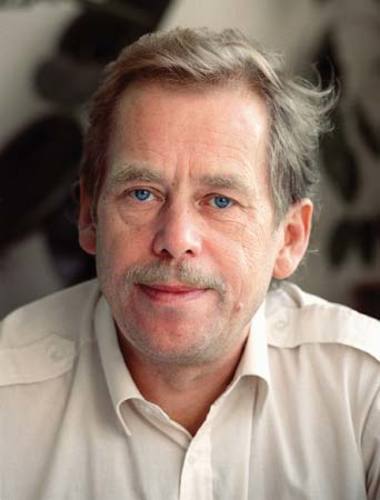
Václav Havel (1936-2011) wrote about the juxtaposition of lies and truths in totalitarian societies. He started out as a playwright, adopting an absurdist style appropriate for writing about the madness of communism in the totalitarian state. He took part in the Prague Spring, which prompted the invasion of Czechoslovakia. He was a co-founder of Charter 77 and a dissident, and he was in jail multiple times, with one of these stays lasting for years. He knew the cost of living a life in truth from personal experience. In 1989, when the Iron Curtain fell, he miraculously became president of Czechoslovakia, and he was re-elected after Slovak independence, in 1993, as president of the Czech Republic. I recommend his famous essay The Power of the Powerless, from 1978. Read it and you will agree with me that Havel can write. I admire him for his clear expression of inner truth in his life and work.
I never met Havel, but I did have the good fortune of spending quite a bit of time in the company of another playwright, Helmert Woudenberg.
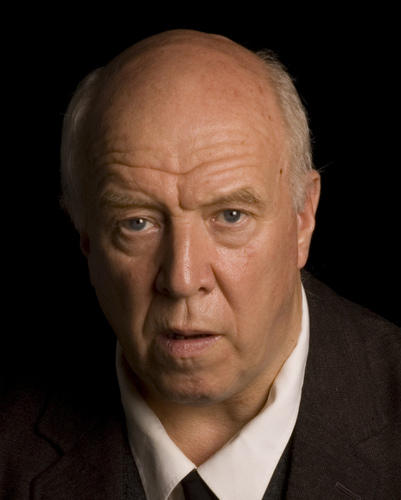
Helmert Woudenberg started his life in a detention camp for war collaborators. He was burdened with a painful family history. His father had served as an SS lieutenant (Untersturmführer) in the German army, and was killed in action just a month before Helmert was born. His grandfather had been a key figure in the NSB, the Dutch national socialist party that collaborated with the enemy during the German occupation.
Helmert Woudenberg became an actor and a playwright. He invented a style of improvisation theatre that can be used for exploring the various emotional ways of relating to your own experience. He used it himself to come to terms with his past, and he taught it to others. I admire him because he taught me that a key to life, and to writing for the theatre, is opening up to tension between opposed emotional attitudes.
Tension is not a bad thing. A coach in intellectual awakening is the Canadian psychologist Jordan Peterson (born 1961). For awakening we have to integrate our shadow, everything that is true about ourselves that we do not want to acknowledge. If the path of truth would be just a matter of following your bliss then everyone would be following it, and everybody would soon become a paragon of wisdom. But that is not how it is. Peterson tells you how it is, in many illuminating Youtube videos. I admire him because of his insistence on the need to speak up, to express ourselves, in all our folly, in all our ignorance. Either speak up when truth stirs in us and become a man or woman with presence, or continue to keep quiet, and in ten or twenty years we are nothing but living shadows.
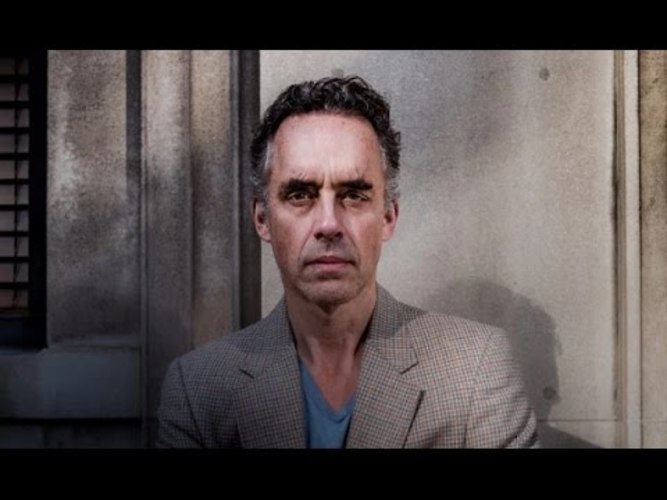
Not that I would like to become a coach myself. Amsterdam has already more coaches than people in need of counseling. What I would like to do in the rest of my life is explore communion, the living we-space that opens up when we are truly open to encountering other human beings, the experience of the first person plural. These days I find myself hanging out with artists, poets and mystics. I read Walt Whitman’s Leaves of Grass and marvel at it. I engage in group meditation sessions where we deeply explore common experience. I find myself writing blog posts that turn into essays, poems, snippets for theatre, and who knows what will come.
I have had many teachers. Ultimately, I hope to learn from everyone I encounter. But one of my all-time favourites is Thich Nhat Hanh, Zen master, Buddhist monk, poet. I met him for the first time in the Summer of 1996, when my wife Heleen and I went to Plum Village in France to take part in a Summer Retreat. I knew him already a bit from his writings. My first encounter was when someone handed me a copy of The Miracle of Mindfulness.
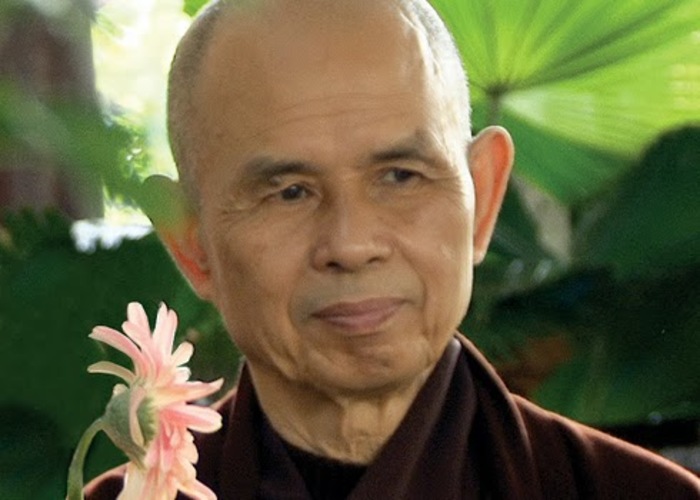
Here is a quote from Thich Nhat Hanh, about the important practice of starting our relationships with each other afresh, time and again, here and now.
Beginning Anew is not to ask for forgiveness. Beginning Anew is to change your mind and heart, to transform the ignorance that brought about wrong actions of body, speech, and mind, and to help you cultivate your mind of love. Your shame and guilt will disappear, and you will begin to experience the joy of being alive. All wrongdoings arise in the mind. It is through the mind that wrongdoings can disappear.
Thich Nhat Hanh is talking here about transformation. If we are truly present with each other we can celebrate together, deeply experience the joy of being alive. There is great joy in touching that deep spot within us where our heart opens. There is great joy in exploring, together, our commonly felt sense. There is great joy in being able to embrace all that we experience.
(the end)
Postscript (January 15, 2020)
At the time of my academic farewell address, in June 2017, Jordan Peterson had impressed me as a fearless defender of the right to speak up. I still believe this message is important, and I agree with his view that a university is not a safe space where students have to be protected from disturbing opinions.
But there is also something to be said for intellectual modesty, for knowing when you are out of your depth. When Peterson talks about climate science he is out of his depth. I was flabbergasted by his tweet from June 2018: “Bjørn Lomborg is in my opinion a very reliable researcher.” I happen to side with the majority of environmental scientists who are very critical of Lomborg. When you click on one of the many Youtube videos of Peterson, chances are that the Youtube video selection algorithm betrays him. It happened to me: the next recommended video was a climate science denial talk. It is a pity.